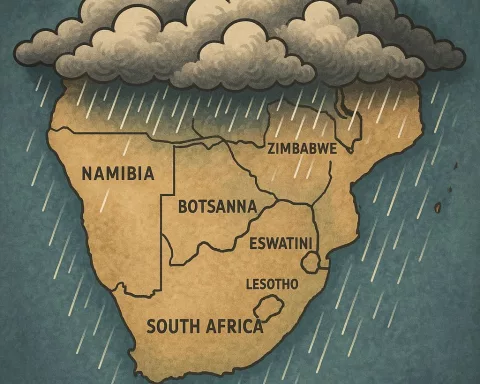Cape Town has been recognized as the only African city with an A-rating for climate action and transparency in 2023, making it a leading force in environmental responsibility in Africa. The Carbon Disclosure Project evaluates cities based on their yearly climate change response disclosures, and Cape Town has fulfilled a set of rigorous criteria to obtain its A-grade, including public disclosure of climate-related actions, a city-wide emissions inventory, and a climate action plan. The A-List rating not only recognizes Cape Town’s environmental achievements but also boosts investor confidence and sets a standard for other African cities in global climate action.
Cape Town is the only African city to secure an A-rating for climate action and transparency in 2023, as part of the 2023 Cities A-List developed by the Carbon Disclosure Project. The grading methodology assesses cities based on their yearly climate change response disclosures, with rigorous criteria including public disclosure of climate-related actions, city-wide emissions inventory, and publishing a climate action plan. Cape Town’s A-List rating not only recognizes its environmental achievements but also boosts investor confidence and sets a standard for other African cities in global climate action.
A Global Recognition for Cape Town
In the scope of our ever-growing environmental consciousness, Cape Town, often fondly called the Mother City, emerges as a model for environmental responsibility. The city recently bolstered its position as a leading force in environment preservation in Africa by becoming the only African city to secure an A-rating for climate action and transparency in 2023, effectively carving its niche in global environmental spheres.
This esteemed acknowledgement is a part of the 2023 Cities A-List, an initiative developed by the Carbon Disclosure Project (CDP), a global non-profit organization endorsing environmental disclosure for nations, cities, and corporations. The CDP was created in 2018 with the objective of recognizing and appreciating the resilience and determination of cities in their fight against climate change. Cape Town, with its steadfast commitment, has managed to retain its A-list position annually since 2019.
A Rigorous Assessment of Climate Actions
CDP’s grading methodology, which spans from A to D, assesses cities based on their yearly climate change response disclosures. It provides an insight into how efficiently they control greenhouse gas emissions while adapting to climate-related risks. To secure the much sought-after A grade, cities must fulfill a set of rigorous criteria. These include public disclosure of their climate-related actions via the CDPI-ICLEI Track, maintaining a city-wide emissions inventory, and publishing a climate action plan.
Furthermore, cities are required to conduct a climate risk and vulnerability assessment and establish a climate adaptation goal. This goal is a testament to their strategies and approaches to address climate change-related hazards. It is noteworthy that only a distinct 13% of all the 930 cities evaluated managed to secure an A grade.
The Impact and Implications of A-List Rating
The A-List rating not only commemorates Cape Town’s environmental achievements but also enshrines its position as Africa’s leading city in climate action. The city government has pledged to reach carbon neutrality by 2050 on a policy level, an ambitious objective that is deeply ingrained in their Climate Change Strategy and the corresponding Action Plan.
As delineated by Cape Town officials, achieving carbon neutrality is a complex process that calls for the introduction of innovative technologies to reduce greenhouse gas emitting fuels and activities that contribute to global warming. This initiative is in line with the wider goal of promoting social, economic, and environmental objectives.
In addition to recognizing the city’s environmental efforts, the A-List rating also sends a powerful message to the international investment community and financial institutions. It boosts their faith in the city’s dedication to transparency in climate action, an essential factor for potential investors. Cape Town officials underlined that such investor confidence is pivotal in implementing their R120 billion 10-year infrastructure portfolio, which includes significant climate action initiatives aimed at improving energy and water security.
Setting A Precedent For Climate Action
The continued recognition and consistent A-List rating of Cape Town signify more than just a badge of honor. They epitomize the city’s unwavering commitment to climate change mitigation and set a standard for other African cities. The victories of the Mother City highlight the potential for all urban areas to play an active role in global climate action and pave the path towards a sustainable future.
1. What is Cape Town’s A-rating for climate action and transparency?
Cape Town has been recognized as the only African city with an A-rating for climate action and transparency in 2023, making it a leading force in environmental responsibility in Africa.
2. How is the Carbon Disclosure Project evaluating cities?
The Carbon Disclosure Project evaluates cities based on their yearly climate change response disclosures, and Cape Town has fulfilled a set of rigorous criteria to obtain its A-grade, including public disclosure of climate-related actions, a city-wide emissions inventory, and a climate action plan.
3. How does the A-List rating impact investor confidence?
The A-List rating not only recognizes Cape Town’s environmental achievements but also boosts investor confidence and sets a standard for other African cities in global climate action. This is important for potential investors in implementing their R120 billion 10-year infrastructure portfolio, which includes significant climate action initiatives aimed at improving energy and water security.
4. What does Cape Town’s commitment to carbon neutrality mean?
The city government has pledged to reach carbon neutrality by 2050 on a policy level, an ambitious objective that is deeply ingrained in their Climate Change Strategy and the corresponding Action Plan. This initiative is in line with the wider goal of promoting social, economic, and environmental objectives.
5. How many cities managed to secure an A grade?
Only a distinct 13% of all the 930 cities evaluated managed to secure an A grade.
6. What does Cape Town’s A-List rating mean for other African cities?
The continued recognition and consistent A-List rating of Cape Town signify more than just a badge of honor. They epitomize the city’s unwavering commitment to climate change mitigation and set a standard for other African cities. The victories of the Mother City highlight the potential for all urban areas to play an active role in global climate action and pave the path towards a sustainable future.












